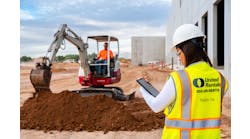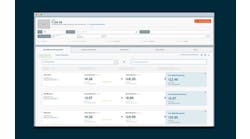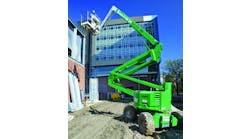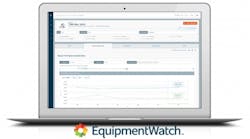Are we scratching our heads yet or what? Looking at the economy now, these are tough times to figure out. As Tim Ford of Genie says in RER's interview with him in this issue, (See Postcards From Las Vegas, page 34) what the headlines in the media are saying about the economy and what rental people were telling him a couple of months ago at The Rental Show were completely different, with the media telling us the bad news about the economy and rental customers saying utilization and demand are up. And for those of you who attended the ConExpo show in Las Vegas last month — and record attendance at that show shows that a lot of people were there, although not necessarily that many rental folks — you could see that the mood was upbeat and most show attendees were looking at equipment as though they expected to be using a lot of it this year.
I won't get into the debate about whether or not the dreaded “R” word is accurate and it really doesn't matter, but anybody who's in the earthmoving business knows very well that the downbeat numbers about housing starts are not exactly a myth.
But from my contacts with people in the rental business, it's still a mixed bag out there, isn't it? We're working on the RER 100 issue, which will be out next month, and with returns in from about 60 companies so far, 2007 numbers range all over the map. Some are up 20 percent, some are down 20 percent and there's a whole lot in the middle somewhere. And the comments people are making about their expectations for the rest of 2008 and going into 2009 indicate there's a lot of uncertainty and one can understand why.
All of this illustrates why this month's cover story by Gary Stansberry is an important one. When the economy is booming as it was from 2004-2006, most rental companies were very profitable. But it's not too hard to make good profits when equipment is flying off the yard at a record pace. I have no interest in spreading doom and gloom, but not many people are seeing equipment fly off the yard that fast right now, and for some, even if it is, they probably increased the size of their fleet significantly over the past few years, which means utilization is not likely to be as high this year as it was in the boom years. And since the crystal balls most of us gaze at tend to be a bit hazy right now, the most important thing you can do is manage carefully.
If your utilization is dropping more than is acceptable, you need to manage your fleet accordingly. Either divest equipment that isn't performing or find a way to put it to use. Make sure equipment isn't sitting in the shop for too long. You might want to run a chart and figure out the average length of time down equipment is in the shop. However you want to figure it out, if equipment is disabled too long, then your systems need improvement to operate more efficiently.
Also, keep a close eye on collections. Undoubtedly some of your customers are having cash-flow problems right now, so make sure your business is not the one that's carrying unnecessary burdens.
Undoubtedly many of you are currently considering or have already implemented cost-cutting measures. You have to do what's right with your business, but I would caution against one mistake a lot of companies make and that's cutting too much from the marketing budget. When times are tough, I believe, it's time to increase the visibility of your company and accelerate efforts to get the word out about the many services you offer. Just because the economy slows down doesn't mean all your customers are out of business. And generally downturns can be the best times to increase market share.
So it may not be easy, but if you manage capital wisely, this could be a time of special growth and improved efficiency for your rental company.
I also recommend investigating how improved technology can help save costs, whether it's an online, computerized dispatching system, telematics systems, which are increasingly affordable and can quickly pay for themselves, or efforts to make your offices relatively paperless. Online billing systems can also be a cost saver. No matter how you do it, cutting costs will be essential and enhanced technology may help cut costs significantly if implemented intelligently.
In the long run, construction will increase. But for the short term, don't bet on it. Just be prepared for it.





